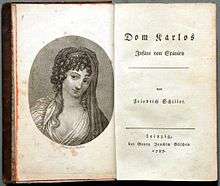Don Carlos (play)
Don Carlos (German: Don Karlos, Infant von Spanien[nb 1][1]) is a (historical) tragedy in five acts by Friedrich Schiller; it was written between 1783 and 1787 and first produced in Hamburg in 1787. The title character is Carlos, Prince of Asturias and the play as a whole is loosely modeled on historical events in the 16th century under the reign of King Philip II of Spain.
| Don Carlos | |
|---|---|
 Don Karlos, Leipzig, 1787 | |
| Written by | Friedrich von Schiller |
| Characters | Carlos, Prince of Asturias Philip II of Spain Duke of Alba Elisabeth of Valois Princess of Eboli Marquis of Posa |
| Original language | German |
| Genre | drama |
| Setting | Spanish Court at Aranjuez |
Opera adaptations
Several operas have been composed on the basis of the play:
- 1844 opera by Michael Costa (libretto Leopold Tarentini, London)
- 1847 opera by Pasquale Bona (libretto Giorgio Giacchetti, Milan)
- 1850 opera by Antonio Buzzolla (libretto Francesco Maria Piave, Venice) (this version was entitled "Elisabetta di Valois")
- 1862 opera by Vincenzo Moscuzza (libretto Leopold Tarentini, Naples)
- 1867 & 1884 Don Carlos and Don Carlo by Giuseppe Verdi (libretto Joseph Méry & Camille du Locle, Paris, Italian translation by Achille de Lauzières and Angelo Zanardini, Milan; German translation by Julius Kapp and Kurt Soldan)
English translations and stage adaptations
- Don Carlos, Prince Royal of Spain: An Historical Drama from the German of Frederick Schiller (PDF). London: W. Miller. 1798.
- Boylan, R. D. (2007). Don Carlos. DoDo Press. ISBN 978-1-4065-3895-3. Reprint of an 1872 translation.
- Sy-Quia, Hilary Collier; Oswald, Peter (2008). Don Carlos and Mary Stuart. Oxford University Press. ISBN 978-0-19-954074-7. Reprint of a 1996 translation (out-of-print).
- Poulton, Mike (2005). Don Carlos. Nick Hern Books. ISBN 978-1-85459-857-8. Poulton's adaptation was directed by Michael Grandage in a well-reviewed staging.[2][3]
- MacDonald, Robert David (2006). Schiller: Volume Two: Don Carlos, Mary Stuart. Oberon Books. ISBN 978-1-84002-619-1. MacDonald's adaptation was first staged in Edinburgh in 1995. It is a verse translation in iambic pentameter; Mary Carole McCauley wrote, "MacDonald creates a sense of ease within his 10-syllable metric lines by using modern idioms, and what the translation lacks in a certain lush richness, it may make up for in accessibility."[4]
Influence on English-language literature and film
Jeffrey L. High (CSULB) has found influences of Schiller's plays on the screenplays for several Hollywood films, and in particular suggests a close correspondence between Don Carlos and the screenplay for Star Wars (1977).[5]
gollark: If you change the license they can just keep using the old version.
gollark: Yes.
gollark: (oh, and to clarify a bit, by "binary" I mean the slightly unixy term for executables, not the binary numeral system)
gollark: And that *also* doesn't stop me from just sticking it on my server and not giving you the binary at all.
gollark: Intellectual property law means that you can't, say, freely give someone else a binary I give you. It doesn't mean you have the source code to it so you can make changes, and it doesn't mean I can't make it only work on one computer (based on windows's "hardware ID" or whatever).
Further reading
- Stevens, Robert (12 November 2004). "Schiller's Don Carlos: the 'light and warmth' of a timeless play". World Socialist Web Site. Review of a 2004 production in Sheffield, England of Mike Poulton's adaptation from the German, along with an extended discussion of play's history.
- University of Oxford production of Don Carlos at the Oxford Playhouse, 18-21 Feb. 2009
Notes
- Schiller replaced the Portuguese spelling "Dom" with the Spanish "Don" in 1801, after Christoph Martin Wieland had made him aware of the difference.
External links

References
- Thiel, Luzia. Freundschafts-Konzeptionen im späten 18. Jahrhundert: Schillers "Don Karlos" und Hölderlins "Hyperion". Würzburg: Königshausen & Neumann, 2004, ISBN 978-3-8260-2744-4, p. 15.
- Highfield, John (4 October 2004). "Don Carlos". The Stage: Reviews.
- Billington, Michael (4 February 2005). "Don Carlos. Gielgud, London". The Guardian.
- McCauley, Mary Carole (23 January 2001). "`Don Carlos' gets seal of approval". The Baltimore Sun. Review of the 2001 production in Baltimore.
- High, Jeffrey L. (2011). "Introduction: Why is this Schiller [Still] in the United States?". In High, Jeffrey L.; Martin, Nicholas; Oellers, Norbert (eds.). Who Is This Schiller Now?: Essays on His Reception and Significance. Camden House. p. 15. ISBN 978-1-57113-488-2.
Schiller experts unfamiliar with Star Wars could place most of the characters with the corresponding Don Karlos characters at a glance at the movie poster. ... The reader will be hard pressed to distinguish the basic plot and character constellation of Star Wars from that of Don Karlos without reference to the specific period and galaxy in question.
This article is issued from Wikipedia. The text is licensed under Creative Commons - Attribution - Sharealike. Additional terms may apply for the media files.